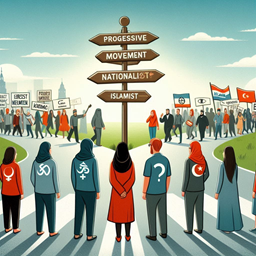By Ron Raskin

The US progressive movement has really stepped into the spotlight in recent years, influencing not only domestic debates but also America’s approach to international relations. It’s been around since the early 2000s, and over the years, more and more young people have joined in, fueling its growth.
But, as with most ideologies, the “big idea” behind it can feel a bit vague. The public-facing message is usually something like: equality, justice, human rights, and diplomacy, understanding and mutual respect between nations. And honestly, who could argue with that? Sounds totally reasonable, right?
The real debates start when those values have to be applied to specific situations — and priorities start to clash. For example: should someone who’s worked hard and studied for years be passed over for a job simply because they belong to an already “successful” group? Is that equality… or just another kind of discrimination?
On the international stage, how does the progressive movement’s logic play out? Israel, in particular, has become a kind of litmus test for these ideological differences.
So, what is the real core idea driving progressivism? Let’s break down the logic behind it — because real dialogue can only happen when we actually understand the reasoning and assumptions at its core.
You could say the progressive movement is basically a Westernized spin on the karma idea from Hinduism and Buddhism — the notion that every action has consequences. Add to that a big-picture goal — a world where everyone lives in peace and equality — and you’ve got the basic blueprint of progressive thinking.
Now, how does that play out in real life? Let’s start with domestic policy and affirmative action. From a progressive perspective, no one can truly be happy if others are suffering. So the aim is to eliminate suffering — or at least make it more or less equal for everyone. That means a child growing up in a struggling community should get priority in education and job opportunities, with the idea that this will reduce the overall “weighted suffering” in society. Less total suffering means less tension, more peace, and ultimately more productivity and happiness.
On a larger scale — international relations — progressives often see violent groups as products of past suffering. The solution, then, isn’t to crush them with force, but to address and compensate for that suffering. The more powerful a group is, the more choices it has, and therefore the more it should “pay” — whether financially or politically — to level the playing field.
That logic helps explain why progressives tend to support Palestinians, show restraint toward Iranian and Russian militarism and imperialism.
It all sounds fair and noble — but so did communism a hundred years ago. Communism promised equality and justice too, but in practice it failed spectacularly. Why? Usually, flawed logic comes from bad assumptions. Interestingly, communism and the progressive movement share some of the same ones:
- If everyone is good, they’ll respect each other, care about others’ needs, and help create a peaceful, prosperous society.
- To make everyone “good,” you need to take active steps, like education. I guess we all remember some of these attempts and how they ended, such as China’s Cultural Revolution, which led to more than a million deaths.
On top of that, the progressive movement adds a couple of additional assumptions that I already touched on above:
- There’s a direct link between past suffering and current bad behavior.
- If you treat people well, everyone (or at least almost everyone) will turn out good.
So, building on these assumptions, it’s not surprising that while there are differences between communism and the progressive movement — mainly in how they view cause and effect (the “karma” perspective) and how they apply their ideas to international relations — there are also many similarities in their approach. Both push for more equality, though progressivism is a little bit softer: it focuses on fairness in outcomes rather than equality of outcomes, and it leans on gentler forms of “re-education.” Ideologically, both grow from a similar worldview.
In reality, things are much more complicated. The success of liberal societies, which focus on personal goals rather than global happiness, has actually brought more happiness overall. It sounds paradoxical, but that’s what history and experience show.
Given that today’s generation grew up on comics and fantasy — where everything is either black or white — it’s not surprising that they gravitate toward simple, clear-cut ideologies instead of learning from history and digging into the messy details.
Unfortunately, naivety is often at the root of the world’s biggest problems. It’s the real door through which dictators and extremists enter — a door that, in such case, is “guarded” not by other wolves, but by sheep.
International Relations
Progressive principles are especially challenged when applied to international relations. Looking back at history, it’s easy to ask whether, according to this approach, Nazi Germany’s behavior could have been justified? After all, they “suffered” under the Treaty of Versailles even more than Russia did from NATO’s westward expansion.
Even though many evil regimes receive some kind of justification — or at least understanding — far beyond common sense, the progressive approach becomes truly paradoxical when it comes to liberal and democratic Israel. Jews have faced a long history of oppression — culminating in the Holocaust — yet many progressives still criticize “affirmative action” like the creation of Israel. Maybe it’s because the state wasn’t just handed to them as compensation, but was built by Jews on their own land, with their own hands. Just kidding, of course…
For some reason, Jews seem to be a special case: instead of compensating them for past suffering, progressives often argue that they should continue to suffer in order to appease Palestinians. It brings to mind the old Jewish saying: “Haven’t the Jewish people suffered enough?”. Whether this comes from a limited historical memory that only goes back to European colonialism, political alignment with Islamists, or some other reason isn’t clear.
There’s no doubt that the US invasions of Iraq and Afghanistan did more harm than good. In those cases, a progressive approach might have worked better — but the problem is using the right tool at the right time. Take Nazi Germany, for example: the Munich Pact’s appeasement was a total failure, and recent attempts to appease Russia haven’t fared much better.
Essentially, there are three ways to deal with a threat:
- Postpone the war and respond minimally if attacked.
- Respond decisively if attacked.
- Launch a pre-emptive attack.
Which strategy works best depends entirely on the context, including:
- Power balance: the stronger the defender, the less threatened and less hasty it may be.
- Stage of the attacker’s ideology: younger, more energized movements are harder to counter.
And there are, of course, many more variables in play…
For the progressive movement, this means their approach to international relations can work—but only sometimes. That’s not what we really want, since even a broken clock is right twice a day. Like any skill or art, the key is knowing when and how to use the right tool.
And one last piece of advice for progressives: whenever a new idea starts gaining traction, there are always opportunists ready to ride the wave — and take it somewhere dark once they’re in charge. Remember Stalin? The self-proclaimed defender of “true” Marxism-Leninism. It looks like the same kind of thing is already starting to happen within progressive circles too…


The progressive movement is based on the term “progress”. And it in turn rests on three pillars: technology, science and social (equal) society. Even if we take into account that in modern political discourse progressivism is often associated with social liberalism, this is still not quite the group that the author of the article is addressing. Therefore, the examples and conclusions are unlikely to be accepted by the group that the author is addressing, and for those who agree with the author’s opinion, more information or a deeper departure into philosophy is needed.